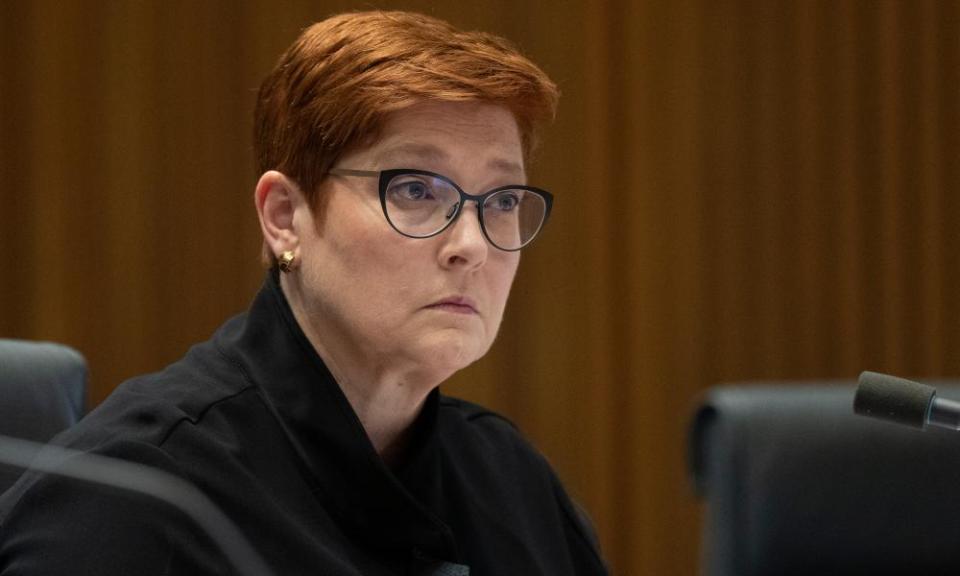Marise Payne declines to welcome adoption of net zero emissions target by Japan and South Korea

The foreign affairs minister Marise Payne says Australia “acknowledges” decisions by Japan and South Korea to adopt net zero targets for 2050, but she has declined to welcome that development, despite Australia’s status as a signatory to the Paris agreement.
This week Japan pledged to cut its greenhouse gas emissions to net zero by 2050, as did South Korea. China last month pledged to reach carbon neutrality by no later than 2060.
Korea, Japan and China are the biggest markets for Australia’s $110bn coal and gas exports.
Payne was asked five times by the shadow minister for foreign affairs, Penny Wong, on Thursday if Australia welcomed our neighbours adopting net zero as a “member of the community of nations” and an active participant in the United Nations framework convention on climate change.
Related: NSW environment minister urges end to 'pointless, backward-looking arguments' about climate action
The foreign affairs minister said she acknowledged that development, but it was not for Australia to “welcome or not welcome” a promise by a strategic partner to hit net zero emissions by mid-century. “They are matters for those countries,” she said.
“We acknowledge the decisions … and then we are very focussed on our own commitments,” Payne said.
Wong persisted, asking: “Don’t you think it’s a good thing?”
Payne replied: “It’s a matter for those countries, senator.”
“We are signatories to Paris,” Wong said.
“I have reinforced that senator,” Payne replied.
Payne said Australia “encouraged and welcomed” other countries meeting their individually determined climate commitments “as we are doing”.
Wong countered: “But you won’t welcome them committing to net zero by 2050?”
“That’s a matter for them, senator,” Payne said.
Wong said: “We welcome some targets but not this target?”
Payne said: “Senator, I have nothing further to add.”
Wong said: “I bet you don’t, that’s a completely illogical position.”
During Thursday’s hearing, Payne also resisted spelling out in clear terms whether Australia would ultimately commit to a net zero target.
The government said it will approach the long-term abatement challenge using “technology not taxes” but it has not ruled out adopting a target.
Payne said the government would set out its long-term abatement strategy before the next international climate conference, due to be held in Glasgow late next year. The government would make its long-term strategy public “when the government is ready to do so”, the foreign minister said.
Wong asked whether the government’s position was it had not yet decided whether to commit to a long-term target. Payne said: “That’ll be determined by government in due course ... The government will set out its plans at an appropriate time in advance of Cop26.”
During Thursday’s hearing, officials from the Department of Foreign Affairs and Trade confirmed no other country, apart from Australia, had yet indicated its intention to use Kyoto carryover credits in order to meet its pledges under the Paris agreement.
Officials said they were also aware of the European Union’s talk about a carbon border adjustment mechanism – but were still seeking clarity on “what it means and how it complies with WTO principles”.
Wong declared Australia was becoming increasingly isolated on climate, and she wanted to know whether Payne agreed with the British prime minister Boris Johnson that acting on climate change was consistent with creating jobs.
Scott Morrison spoke to Johnson on Tuesday night, and the offices of the two prime ministers later released readouts of their conversation with different emphases.
Related: Australian PM's office omits net zero emissions from account of Morrison's talk with Johnson
According to the British readout, Johnson raised the important of net zero emissions, and “stressed” to Morrison that “we need bold action to address climate change, noting that the UK’s experience demonstrates that driving economic growth and reducing emissions can go hand in hand”.
Payne responded to Wong’s question in the negative. The foreign affairs minister said both Britain and Australia agreed “that achieving emission reductions must not be at the expense of jobs anywhere, whether it’s here or in the UK, and that’s why we’re taking the approach we take”.
Pressed by Wong again whether she agreed with Johnson that acting on climate change was consistent with protecting and creating jobs, Payne said: “I’m not sure if I would put it that way.
“I would put it in fact how I answered you before, which is we believe our commitment here through the Paris agreement … the work we’ve done on future technologies, our technology investment roadmap, are about reducing emissions, protecting Australian jobs and the Australian economy.”
Net zero by 2050 is an increasingly uncontroversial position. Every Australian state has signed up to net zero emissions by 2050, and these commitments are expressed either as targets or aspirational goals.
Groups representing business, unions, farmers, investors, the environment and social policy advocates also say Australia should adopt climate change policies that can put it on a stable path to net zero national greenhouse gas emissions if it is to play its part in the Paris agreement.
This week, Payne’s New South Wales Liberal colleague, Matt Kean, launched a clarion call for his party to represent “the forgotten people” who “don’t march down George Street” and “don’t have a platform on Sky News” but support meaningful action on climate change.
Borrowing “the forgotten people” locution from the Liberal party founder, Robert Menzies, Kean told a forum organised by the Australia Institute on Wednesday that the free market was driving an inexorable transition to low-emission energy sources but “politics and ideology” had been getting in the way of market forces.
“Climate change didn’t start out as a political issue – we made it one – and this needs to end,” Kean said.

 Yahoo News
Yahoo News 